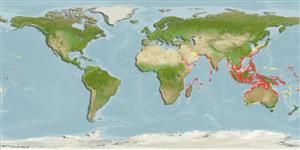分類 / Names
共通名の | 類義語 | Catalog of Fishes(部類, 種) | ITIS | CoL | WoRMS | Cloffa
板鰓亜鋼(サメとエイ類) (sharks and rays) >
Myliobatiformes (Stingrays) >
Dasyatidae (Stingrays) > Urogymninae
Etymology: Himantura: Greek, iman, imantos = thong, strap + Greek, oura = tail (Ref. 45335).
More on author: Gmelin.
Environment: milieu / climate zone / depth range / distribution range
生態学
海; 汽水性の 底生の; 両側回遊性 (Ref. 51243); 深さの範囲 20 - 50 m (Ref. 28016). Subtropical; 23°C - 26°C (Ref. 12468); 38°N - 37°S, 34°E - 149°W
Indo-Pacific: Persian Gulf (Ref.80050); Red Sea (and eastern Mediterranean via Suez Canal) to southern Africa and French Polynesia, north to Taiwan, south to Australia. Also in the Arafura Sea (Ref. 9819). Collected from the estuary of the River Ganges (Ref. 33178). This name has been used for a number of similar spotted species (Ref. 6871). Probably a species complex (Ref. 35766). Its identity has been confused in many publications and Micronesian specimens should be re-examined (Ref. 37816).
Length at first maturity / サイズ / 重さ / 年齢
Maturity: Lm 83.0, range 82 - 84 cm
Max length : 200 cm WD オス/雌雄の選別がない; (Ref. 3263); common length : 45.0 cm TL オス/雌雄の選別がない; (Ref. 5450); 最大公表体重: 150.0 kg (Ref. 124786)
背面の脊椎 (合計) : 0; 肛門の骨: 0. Huge stingray with conspicuous dark spots on a light brown disc; spots well-spaced in young but crowded to form reticulated pattern in adult; white ventrally; tail marked with bands of black and white; snout sharply pointed; disc with narrowly rounded outer corners, and tail long, slender and nearly three times body length when intact, with no caudal finfolds; disc without thorns but with band of flat denticles along midback (in adults); usually 1 medium-sized sting on tail (Ref. 5578).
Common off sandy beaches and in shallow estuaries and lagoons; also found in sandy areas of coral reefs (Ref. 9710). Also offshore down to 50 m depth (Ref. 5578). May enter fresh water (Ref. 5578). Feeds on small fishes, bivalves, crabs, shrimps, worms (Ref. 3263) and jellyfishes (Ref. 37816). Ovoviviparous (Ref. 50449). Common catch of the demersal tangle net, bottom trawl, longline and beach seine fisheries (Ref.58048). Popular angling fish (Ref. 3263). Not esteemed as a food fish (Ref. 3263). Used in Chinese medicine (Ref. 12166). Tail is used as It is parasitised by the monogeneans Dendromonocotyle colorni and Dendromonocotyle ukuthena on the dorsal skin surface (Ref. 124058).
Life cycle and mating behavior
成熟 | 繁殖 | 放精 | 卵 | 生産力 | 幼生
Exhibit ovoviparity (aplacental viviparity), with embryos feeding initially on yolk, then receiving additional nourishment from the mother by indirect absorption of uterine fluid enriched with mucus, fat or protein through specialised structures (Ref. 50449). Distinct pairing with embrace (Ref. 205). Distinct pairing with embrace (Ref. 205). Bears 3 to 5 young in the summer (Ref. 5578). Size at birth about 21 (Ref.58048) - 28 cm WD (Ref. 6871).
Fricke, R., 1999. Fishes of the Mascarene Islands (Réunion, Mauritius, Rodriguez): an annotated checklist, with descriptions of new species. Koeltz Scientific Books, Koenigstein, Theses Zoologicae, Vol. 31:759 p. (Ref. 33390)
IUCNのレッドリストの状況は (Ref. 130435: Version 2024-2)
絶滅危惧 (EN) (A2d); Date assessed: 27 November 2020
Human uses
水産業: 少数商業の; ゲームフィッシュ: はい; 水族館・水槽: 商業
用具
特記事項
XMLをダウンロードして下さい
インターネットの情報源
Estimates based on models
Preferred temperature (Ref.
123201): 24.2 - 28.6, mean 27.8 °C (based on 334 cells).
Phylogenetic diversity index (Ref.
82804): PD
50 = 0.5000 [Uniqueness, from 0.5 = low to 2.0 = high].
Bayesian length-weight: a=0.02138 (0.01173 - 0.03897), b=3.14 (2.97 - 3.31), in cm total length, based on LWR estimates for this species & (Sub)family-body (Ref.
93245).
栄養段階 (Ref.
69278): 3.6 ±0.6 se; based on diet studies.
回復力 (Ref.
120179): 非常に低い, 14年以上の倍増期間の最小個体群 (Fec=3-5).
Fishing Vulnerability (Ref.
59153): Very high vulnerability (90 of 100).
Nutrients (Ref.
124155): Calcium = 3.06 [0.35, 48.42] mg/100g; Iron = 0.343 [0.028, 3.859] mg/100g; Protein = 22.3 [19.6, 25.0] %; Omega3 = 0.113 [0.036, 0.335] g/100g; Selenium = 15.7 [2.7, 86.6] μg/100g; VitaminA = 10.9 [0.9, 124.7] μg/100g; Zinc = 0.504 [0.035, 5.570] mg/100g (wet weight);
